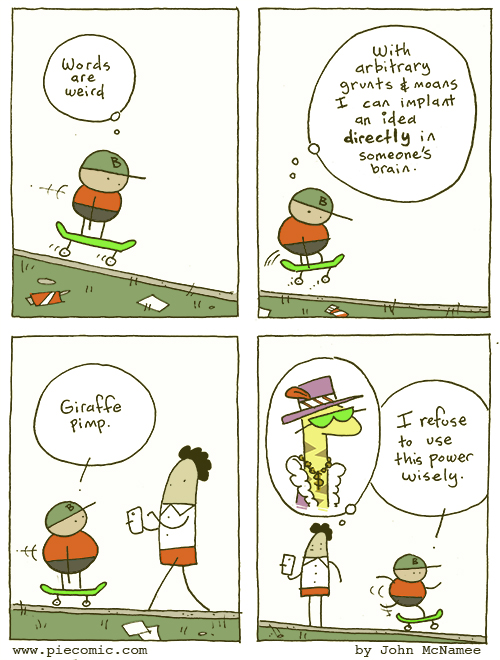Words
« previous post | next post »
The 4/30/2015 Pie Comic:

[h/t George Kesteven]
The end of Borges' essay "El Idioma Analítico de John Wilkins":
Esperanzas y utopías aparte, acaso lo más lúcido que sobre el lenguaje se ha escrito son estas palabras de Chesterton: "El hombre sabe que hay en el alma tintes más desconcertantes, más innumerables y más anónimos que los colores de una selva otoñal… cree, sin embargo, que esos tintes, en todas sus fusiones y conversiones, son representables con precisión por un mecanismo arbitrario de gruñidos y de chillidos. Cree que del interior de un bolsista salen realmente ruidos que significan todos los misterios de la memoria y todas las agonias del anhelo" (G. F. Watts, pág. 88, 1904).
Leaving hopes and utopias apart, probably the most lucid ever written about language are the following words by Chesterton: "He knows that there are in the soul tints more bewildering, more numberless, and more nameless than the colours of an autumn forest… Yet he seriously believes that these things can every one of them, in all their tones and semitones, in all their blends and unions, be accurately represented by an arbitrary system of grunts and squeals. He believes that an ordinary civilized stockbroker can really produce out of his own inside noises which denote all the mysteries of memory and all the agonies of desire" (G. F. Watts, page 88, 1904).
Morten Jonsson said,
May 4, 2015 @ 9:52 pm
Borges' quotation from Chesterton always reminds me of Flaubert's lament: “Language is a cracked kettle on which we beat out tunes for bears to dance to, while all the time we long to move the stars to pity."
Michael said,
May 5, 2015 @ 5:02 am
Too beautiful for words…
The Power of Language | The Idlers said,
May 5, 2015 @ 11:17 am
[…] HT: Language Log […]
bratschegirl said,
May 5, 2015 @ 11:55 am
Per George Lakoff, I am now trying mightily not to think of a giraffe pimp.
Failing utterly, but trying nonetheless.
Stephen Hart said,
May 5, 2015 @ 2:23 pm
The idea is related to the famous xkcd password strength cartoon:
https://xkcd.com/936/
John Lawler said,
May 5, 2015 @ 2:36 pm
But which one are you thinking of? A giraffe who is a pimp, or a pimp who prositutes giraffes? The arbitrary system of grunts and squeals doesn't do everything for you.
cameron said,
May 5, 2015 @ 2:49 pm
I'll see Morten Jonsson's Flaubert and raise him a Mallarmé:
"Je dis: une fleur! et, hors de l'oubli où ma voix relègue aucun contour, en tant que quelque chose d'autre que les calice sus, musicalement se lève, idée même et suave, l'absente de tous bouquets."
bratschegirl said,
May 5, 2015 @ 11:12 pm
@John Lawler: Of course, if one allows for a giraffe who is a pimp, then the pimp who prostitutes giraffes could be almost any species. I'm going to have interesting dreams tonight.
David Kidd said,
May 6, 2015 @ 12:41 pm
The link to the page including the information about Wilkins reminds me of Neal Stephenson's awesome trilogy "The Baroque Cycle", which includes Wilkins (as well as Newton and Leibniz and others) as characters. Stephenson links the problems that the Royal Society and others were grappling with at that time to the development of computers and cryptography (also explored in his historical-speculative-fiction novel "Cryptonomicon"). The fictional account does a good job of showing the problems related to Borges' criticisms. In addition, the earlier link to the previous LL post about Chesteron, Carlin, and Borges (http://languagelog.ldc.upenn.edu/nll/?p=8930) reminds me of what I consider one of the most important works I read: Michael Reddy's "The Conduit Metaphor"